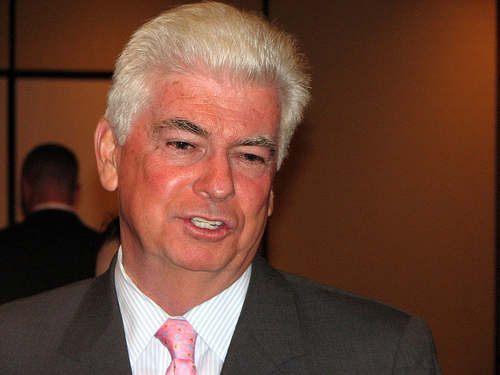
Flickr/David Berkowitz
The Senate’s plan to create a “super regulator” through its financial reform package appears to be gaining momentum in Congress and the White House. The new watchdog, which would actually be a council of regulators, would be led by the Treasury Secretary and would assume responsibility for monitoring systemic risk in the financial markets, i.e., when a particular bank or several them become so interconnected and powerful that failure would pose a threat to the entire economy. The super-regulator plan, the New York Times reports, has a fair amount of support on both sides of the aisle in the Senate, including backing from Sen. Chris Dodd (D-CT), Sen. Mark Warner (D-VA), and Sen. David Vitter (R-LA). The details on the council are still fuzzy at this point as to who’d be on the council, but hopefully there will be updates on that soon.
A main point of contention with the super-regulator plan is that it would strip the Federal Reserve of much of its regulatory and systemic-risk powers, a move that’s not surprisingly drawn the ire of the Fed’s leaders and allies. Sen. Judd Gregg (R-NH) disagreed with giving away the Fed’s bank oversight powers—which, as it’s been widely reported, the Fed made scant use of—saying the Fed deserves to keep its bank-regulating role. Fed chairman Ben Bernanke said in October, however, that he supported a Treasury-led regulatory council, stressing the importance of moving “from an institution-by-institution supervisory approach to one that is attentive to the stability of the financial system as a whole,” despite the consequences it would have on the Fed’s role in watching over banks’ products and practices.
The council of regulators proposal first surfaced in negotiations last summer, when the idea was first floated by the White House and the Treasury. That proposal, however, reserved far less power for the council—”You don’t convene a committee to put out a fire,” Treasury Secretary Tim Geithner said in June—but later conceded that some kind of council could advise the Fed and have a more complimentary role in bank oversight. Those previous talks—like so many other subjects—fell by the wayside as health-care reform took over the Senate’s deliberations, but bits and pieces of those earlier negotiations are now resurfacing.
Still, as was the case in last summer’s debate, the fine print with these new super-regulator talks needs to be ironed out, like whether the council would report to Congress and issue reports and whether it would draw on other agencies like the SEC. And speaking of the SEC, the new council is likely to have the backing of people like SEC chair Mary Schapiro and FDIC chair Sheila Bair, who backed the earlier proposal in July of last year. Perhaps they see this council as a chance for them to extend their jurisdiction and clout—so of course they’re going to support it. Which raises the question: If what lawmakers fear is the fragmented, do-nothing approach to financial regulation, will creating a glorified committee made of a bunch of different regulators really make much of a difference?












